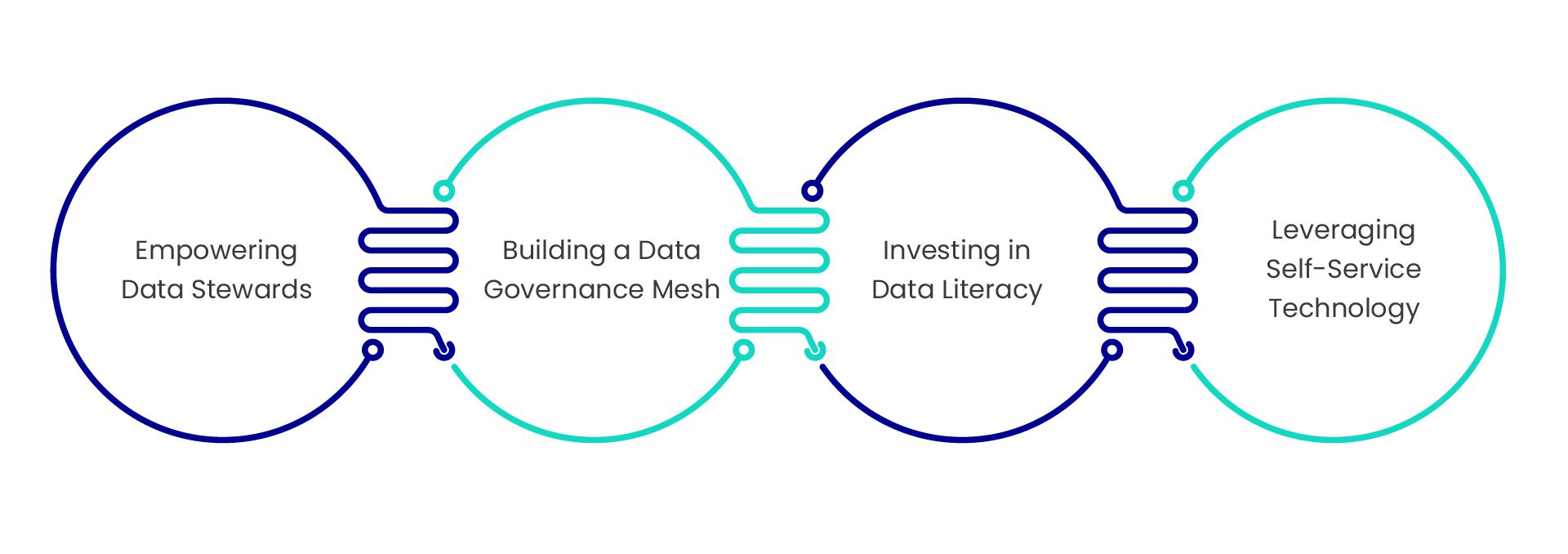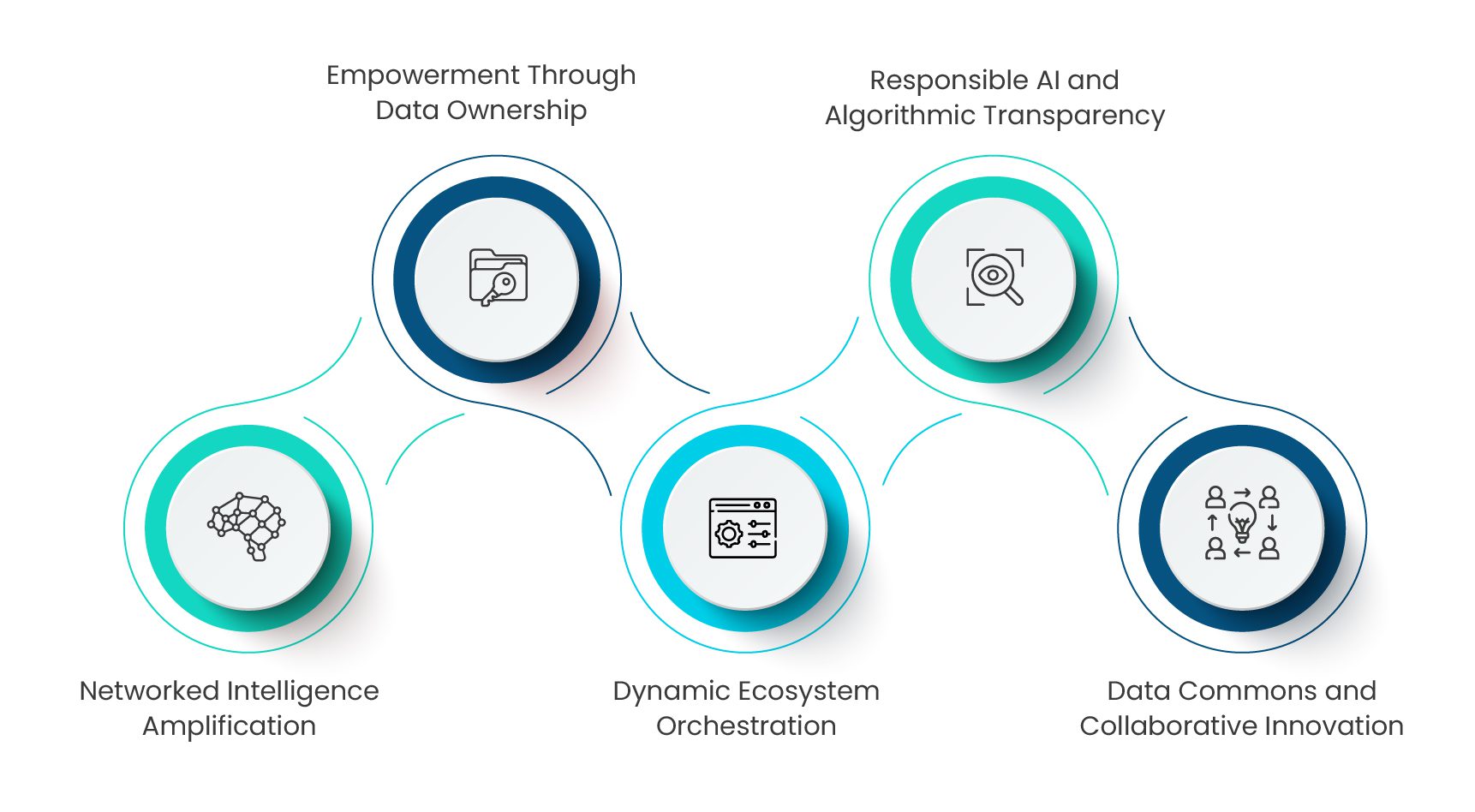- Business environments are undergoing rapid change, requiring evolution in governance structures to keep pace with globalization, technological advancements, and shifting societal expectations.
- Change management plays a crucial role in orchestrating successful transformations, but traditional methods often overlook the macro conditions of today’s world.
- Data and decentralization offer strategic and agile approaches to navigating governance change management by harnessing the power of data analytics, AI, and ML to inform decision-making.
- Decentralization empowers individuals closer to the ground, fostering innovation and agility by allowing them to make data-driven decisions tailored to specific needs within established frameworks
- This journey towards a data-driven and decentralized future requires courage and a commitment to empowering our people. It’s a shift from being sole architects of change to becoming facilitators and enablers, fostering a culture of ownership and accountability.
In a 2023 study by the World Economic Forum, 84% of executives believe that the pace of business change is accelerating. We are all operating in a landscape of constant flux. Globalization, technological advancements, and evolving societal expectations all pose dynamic challenges and opportunities. As companies strive to keep up, their governance structures, the frameworks that guide decision-making and operations, must also evolve. This is where change management steps in, acting as the choreographer for a smooth and successful transformation. However, traditional approaches to change often fall short, failing to account for the macro conditions shaping our world today. This is where data and decentralization emerge as game-changers, offering a more strategic and agile approach to navigating the complexities of governance change management.
The deluge of data at our disposal presents both a blessing and a curse. While the sheer volume can be overwhelming, harnessing its power allows us to gain unprecedented insights into our stakeholders, markets, and internal operations. Data analytics, coupled with artificial intelligence(AI) and machine learning (ML), can identify trends, predict outcomes, and illuminate hidden connections. This allows us to move beyond gut feeling and anecdotal evidence, basing our decisions on a foundation of objective, quantifiable information. Consider, for example, a recent study which found that companies leveraging data analytics for change management initiatives saw a 30% increase in success rates, empowering them to tailor their strategies to specific stakeholder needs and anticipate potential roadblocks, mitigating resistance and fostering smoother transitions.
However, simply accumulating data is not enough. To unlock its true potential, we must embrace decentralization. The traditional, top-down model of governance, where decisions cascade from the C-suite down to lower levels, often stifles innovation and agility. Decentralization, on the other hand, empowers individuals closer to the ground, allowing them to leverage their domain expertise and make data-driven decisions within established frameworks. Imagine a large healthcare organization aiming to improve patient outcomes through data-driven insights. A centralized approach might involve mandating specific data collection and analysis protocols across all hospitals within the network. This one-size-fits-all strategy, however, may not capture the nuances of individual patient populations and local healthcare environments. By decentralizing the process and empowering local clinicians and data analysts to tailor data collection and analysis specific to their hospital’s needs, the organization can gain deeper, more relevant insights and implement targeted interventions to improve patient care.
Decentralization fosters a culture of ownership and accountability, encouraging individuals to actively participate in the change process. This not only leads to more informed and contextually relevant decisions but also increases buy-in and reduces resistance. A recent study revealed that organizations with decentralized structures reported a 25% increase in employee engagement during change initiatives, highlighting the positive impact on employee morale and overall success.
Successfully implementing a data-driven and decentralized approach to change management requires a strategic shift in our mindset. We must move from being the sole architects of change to becoming facilitators and enablers. This blog digs deeper into the Why, What, and How of Decentralized Change Management Governance. Let’s find out more.
Market Forces Driving Decentralized Governance
Several key currents are shaping the need for a new approach to governance:
- The Data Deluge: By 2025, the volume of data is projected to reach a staggering 180 zettabytes, according to IDC. This necessitates a more distributed and adaptable governance framework to manage and utilize this information effectively. Traditional, centralized structures struggle to keep pace with the sheer volume and velocity of data, hindering its ability to inform decision-making and drive change.
- Regulatory Riptides: Data privacy regulations like GDPR and CCPA are forcing organizations to re-evaluate their data ownership and usage practices. Decentralized governance empowers local teams to navigate these regulations with agility, ensuring data security and compliance across the organization. This is crucial, as non-compliance can lead to hefty fines and reputational damage, jeopardizing market competitiveness.
- The Rise of Agile Innovation: The winds of change are blowing towards agile methodologies and disruptive technologies like AI and blockchain, all of which thrive on data accessibility and collaboration. Centralized, bureaucratic governance structures can act as an anchor, hindering the agility and innovation needed to succeed in today’s dynamic market. Decentralization fosters a culture of experimentation and rapid iteration, allowing organizations to adapt quickly to changing customer needs and emerging market trends.
- Evolving Workforce Expectations: Younger generations entering the workforce value autonomy and purpose-driven work. Decentralized governance empowers individuals with ownership, fostering a sense of purpose and driving increased engagement and productivity. This aligns well with the shifting expectations of the modern workforce, leading to a more engaged and motivated employee base.
These factors paint a clear picture: the traditional, top-down approach to governance is no longer seaworthy. Organizations need to embrace data-driven, decentralized structures that unlock the full potential of information and empower individuals to steer the ship of change.
Strategies for Effective Decentralized Governance
So, how do we navigate these currents and build a governance framework that empowers effective change management? Here are some key strategies to equip your ship with the right sails:

- Empowering Data Stewards: Imagine data stewards as the captains of their own data ships. They are responsible for data ownership, quality, and compliance within their domain and are equipped with the knowledge and authority to make data-driven decisions at the local level. This empowers individuals with the expertise and agency to make informed decisions that can drive positive change within their specific areas of focus.
- Building a Data Governance Mesh: Instead of a single, centralized “data lake,” we need a “data mesh.” This allows different teams to manage and share data assets like islands collaborating in an archipelago, fostering collaboration while ensuring data consistency and security through well-defined guidelines and standards. This distributed approach promotes information flow and collaboration while maintaining data integrity, crucial for effective decision-making across the organization.
- Investing in Data Literacy: Upskilling your workforce is akin to training your crew. Equipping individuals across all levels with the knowledge and tools to understand, analyze, and interpret data effectively empowers them to participate meaningfully in data-driven decision-making and change management initiatives. This fosters a data-driven culture where everyone can contribute to the success of change initiatives by leveraging data insights.
- Leveraging Self-Service Technology: Technology acts as your compass and navigation tools. Utilize software that has the ability to empower decision-makers at every level by granting data owners complete control over their data assets, orchestrating a unified data fabric, breaking down data silos, and enabling them to facilitate the discovery, analysis, and actionability of enterprise data, all while integrating security, governance, and AI-powered insights within IT guardrails. These tools enable efficient data management, facilitate communication and collaboration across the decentralized structure, and ensure data security, safeguarding valuable information and fostering trust within the organization.
This journey towards a data-driven and decentralized future requires courage and a commitment to empowering our people. However, the potential rewards are significant – increased agility, improved decision-making, and a more engaged workforce, all contributing to achieving our organizational goals and navigating the ever-changing world with greater success.
The Impact of a Data-Driven, Decentralized Approach
The “what” of this approach translates into tangible benefits for your organization, propelling it toward a prosperous future:

- Networked Intelligence Amplification: Beyond traditional decision-making, a decentralized, data-driven approach enables the amplification of collective intelligence. By decentralizing data access and analysis tools, organizations can tap into the expertise of diverse teams and even external stakeholders. This networked intelligence fosters innovation through cross-pollination of ideas and perspectives, driving unique solutions that might not emerge in a centralized model.
- Empowerment Through Data Ownership: Decentralization coupled with data ownership initiatives empowers individuals within organizations to become active participants in the data ecosystem. Through self-sovereign data frameworks, employees can control and contribute to their own data profiles, allowing for more personalized and meaningful insights. This not only enhances employee engagement but also fosters a culture of data stewardship and responsibility.
- Dynamic Ecosystem Orchestration: In a decentralized data ecosystem, organizations can dynamically orchestrate interactions and transactions across a network of stakeholders. Through smart contracts and decentralized autonomous organizations (DAOs), data-driven decisions can trigger automated actions and agreements, enabling unprecedented levels of agility and efficiency in complex ecosystems such as supply chains or marketplaces.
- Responsible AI and Algorithmic Transparency: Decentralization facilitates the development of responsible AI systems by distributing data processing and decision-making capabilities. By design, these systems can prioritize privacy, fairness, and accountability, ensuring that AI algorithms are transparent and auditable. This not only mitigates the risks of algorithmic bias but also fosters trust among users and regulators.
- Data Commons and Collaborative Innovation: Embracing a data-driven, decentralized approach can lead to the emergence of data commons—a shared pool of data resources that are accessible to a community of users. These data commons serve as fertile ground for collaborative innovation, where participants can freely exchange insights, co-create solutions, and collectively address complex challenges. By leveraging the collective intelligence of the crowd, organizations can unlock new opportunities and drive societal impact at scale.
A Case Study in Action: Netflix Sets Sail with Decentralized Governance
Netflix, a pioneer in data-driven decision-making, exemplifies the successful implementation of decentralized governance. The company empowers individual teams to own their data and make data-driven decisions within established frameworks. This approach has contributed to Netflix’s success in personalizing user experiences, recommending content effectively, and staying ahead of the curve in the ever-evolving entertainment industry, demonstrating the power of this approach in the real world.
Embracing the data deluge and transitioning to a decentralized governance structure is no longer a choice, but a necessity. By empowering individuals with data, fostering collaboration, and enabling informed decision-making at all levels, organizations can navigate change effectively and thrive in the data-driven future. Remember, the ocean of data can be a source of immense power, but only with the right governance framework and an intelligent & comprehensive data management solution can we harness its true potential. To know more about how Data Dynamics can help chart your course into the new age of decentralized change management, please visit www.datadynamics,com or reach out to us at solutions@datdyn.com or (713)-491-4298.






